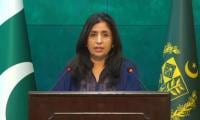7/26/2001 poll-1 (3), issued on January 17, 2007 by the interior ministry. Another report, issued by police, reveals that group has been constantly under the watch of the law enforcement and intelligence agencies after the interior ministry had issued the notification.
Intelligence agencies had sent a list to police about 48 extortionists of which 19 were affiliated with the ST.
Sources in the home department said in various other reports submitted before the apex court while it was hearing the Karachi law and order implementation case, it was mentioned that ST was involved in target killing and extortion cases.
However, Shaikh claimed that the ST had been removed from the watch-list by the previous Pakistan People’s Party-led federal government by the end of its tenure.
‘Defender’ of mosques
The ST was formed in 1990 to prevent the mosques and madrassas of the Barelvi school of thought from being “captured” by Deobandi and Ahle Hadith groups in the city.
“Our main motto was ‘Jawaniyan lutaain gai, masjidain bachayein gai [We will sacrifice our lives to protect our mosques],” said Shaikh.
Muhammad Amir Rana, an Islamabad-based security expert who monitors the militant groups operating in the region, said the ST was created to counter the growing influence of different groups belonging to the Deobandi and Ahle Hadith schools of thought, and soon after its inception, it began clashing with its rivals, especially with the then Sipah-e-Sahaba Pakistan.
However, Rana drew a distinction between the ST and the SSP.
“Although the ST is involved in violence, it doesn’t belong on the list of militant organisations such as the SSP as it has no links to the militancy or terrorism in Afghanistan, Kashmir, the Middle East or elsewhere,” he explained.
“As the ST didn’t have any tactical sectarian support from any Arab country or a nexus with militant groups in the country or abroad that could provide its cadres with training and logistics, the group eventually decided to play a political role.”
Law enforcement officials told The News that in the beginning, armed ST men fought with SSP activists in different parts of the city, especially in North Karachi and Baldia Town.
However, they added, the ST later became embroiled in a turf war with the Muttahida Qaumi Movement after the former emerged as a challenge to the latter’s political domination in the city after the 2002 general polls as both parties drew their support from the Urdu-speaking communities.
Naimat Khan, a Karachi-based journalist, said the ST was among the elements responsible for the law and order problem in Karachi.
“The group has taken hold of the central business district where it has been raising funds by forcibly collecting donations from traders,” Khan added.
"On the political front, it seems that ST has achieved nothing much except staging pro-Mumtaz Qadri rallies.”
ST factions
The ST has been facing internal rifts in recent times. Ejaz Sarwat Qadri heads the powerful component of the group, which has recently renamed itself as the Pakistan Sunni Tehreek.
Muhammad Bilal Qadri, the son of ST founder Saleem Qadri, has formed his own faction after developing differences with Ejaz Qadri and others.
In April 2006, the central leaders of the ST, including Abbas Qadri, Iftikhar Bhatti and Akram Qadri, were killed in a bomb attack during a congregation at Nishtar Park.
This picture taken on January 30, 2023, shows commuters passing through the Empress Market in Pakistan's port city of...
Representational image shows personnel of the Pakistan Customs. — Facebook@Pakistan Customs/FilePakistan Customs...
This representational image shows the Pakistan Coast Guard personnel pictured with recovered narcotics....
View of incomplete construction work of drinking water pipeline located on University Road in Karachi on December 18,...
The front facade of the Sindh High Court building in Karachi. — AFP/FileThe Sindh High Court on Wednesday directed...
This representational image shows a conference organised by the School of Leadership on December 15, 2024. —...







